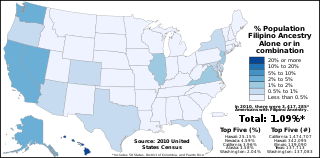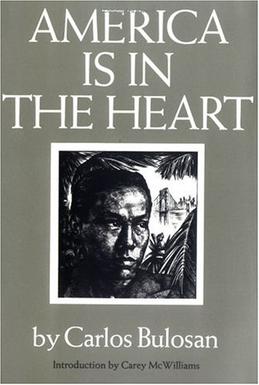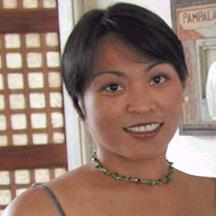
Filipino Americans are Americans of Filipino ancestry. Filipinos and other Asian ethnicities in North America were first documented in the 16th century as mariners and crew members on ships sailing to and from New Spain (Mexico) and a handful of inhabitants in other minute settlements during the time Louisiana was an administrative district of the Viceroyalty of New Spain (Mexico). Mass migration did not begin until the 20th century, when the Philippines was a U.S. territory.
Carlos Sampayan Bulosan was a Filipino novelist and poet who immigrated to the United States on July 1, 1930. He never returned to the Philippines and he spent most of his life in the United States. His best-known work today is the semi-autobiographical America Is in the Heart, but he first gained fame for his 1943 essay on The Freedom from Want.

America Is in the Heart, sometimes subtitled A Personal History, is a 1946 semi-autobiographical novel written by Filipino American immigrant poet, fiction writer, short story teller, and activist, Carlos Bulosan. The novel was one of the earliest published books that presented the experiences of the immigrant and working class based on an Asian American point of view and has been regarded as "[t]he premier text of the Filipino-American experience." In his introduction, journalist Carey McWilliams, who wrote a 1939 study about migrant farm labor in California, described America Is in the Heart as a “social classic” that reflected on the experiences of Filipino immigrants in America who were searching for the “promises of a better life”.
Asian American Studies is an academic discipline which critically examines the history, issues, sociology, religion, experiences, culture, and policies relevant to Asian Americans. It is closely related to other Ethnic Studies disciplines, such as African American Studies, Latino Studies, and Native American Studies.
Resil Buagas Mojares is a Filipino historian and critic of Philippine literature best known as for his books on Philippine history. He is acclaimed by various writers and critics as the Visayan Titan of Letters, due to his immense contribution to Visayan literature. He was recognized in 2018 as a National Artist of the Philippines for Literature - a conferment which represents the Philippine state's highest recognition for artists.

Bienvenido N. Santos was a Filipino-American fiction, poetry and nonfiction writer. He was born and raised in Tondo, Manila. His family roots are originally from Lubao, Pampanga, Philippines. He lived in the United States for many years where he is widely credited as a pioneering Asian-American writer.
Epifanio San Juan Jr., also known as E. San Juan Jr., is a known Filipino American literary academic, Tagalog writer, Filipino poet, civic intellectual, activist, writer, essayist, video/film maker, editor, and poet whose works related to the Filipino Diaspora in English and Filipino writings have been translated into German, Russian, French, Italian, and Chinese. As an author of books on race and cultural studies, he was a "major influence on the academic world". He was the director of the Philippines Cultural Studies Center in Storrs, Connecticut in the United States. In 1999, San Juan received the Centennial Award for Achievement in Literature from the Cultural Center of the Philippines because of his contributions to Filipino and Filipino American Studies.
Howard Winant is an American sociologist and race theorist. Winant is Distinguished Professor of Sociology at the University of California, Santa Barbara. Winant is best known for developing the theory of racial formation along with Michael Omi. Winant's research and teachings revolve around race and racism, comparative historical sociology, political sociology, social theory, and human rights.

France Winddance Twine is a Black Native American sociologist, ethnographer, visual artist, and documentary filmmaker. Twine has conducted field research in Brazil, the UK, and the United States on race, racism, and anti-racism. She has published 11 books and more than 80 articles, review essays, and books on these topics. Her research has made significant contributions to interdisciplinary research in gender and sexuality studies, racism/anti-racism, feminist studies, science and technology studies, British cultural studies, and qualitative research methods. In 2020, she was awarded the Distinguished Career Award by the Race, Class, and Gender section of the American Sociological Association for her intellectual, innovative, and creative contributions to sociology. Twine is the first sociologist to publish an ethnography on everyday racism in rural Brazil after the end of military dictatorship during the "abertura".
Barrie Thorne is a professor of sociology and of Gender and Women's Studies at the University of California, Berkeley.
Evelyn Seiko Nakano Glenn is a professor at the University of California, Berkeley. In addition to her teaching and research responsibilities, she served as founding director of the university's Center for Race and Gender (CRG), a leading U.S. academic center for the study of intersectionality among gender, race and class social groups and institutions. In June 2008, Glenn was elected president of the 15,000-member American Sociological Association. She served as president-elect during the 2008–2009 academic year, assumed her presidency at the annual ASA national convention in San Francisco in August 2009, served as president of the association during the 2009–2010 year, and continued to serve on the ASA governing council as past-president until August 2011. Her presidential address, given at the 2010 meetings in Atlanta, was entitled "Constructing Citizenship: Exclusion, Subordination, and Resistance", and was printed as the lead article in the American Sociological Review.

Rhacel Salazar Parreñas is Professor of Sociology and Gender Studies at USC. She previously taught at Brown University, the University of California, Davis and the University of Wisconsin–Madison. Her research has been featured in NPR's "The World", Bloomberg News, the New York Times, the Wall Street Journal, de Volkskrant, and the American Prospect. Parreñas has written five monographs, co-edited three anthologies, and published a number of peer-reviewed articles.

The history of Filipino Americans begins indirectly, when Filipino slaves and indentured servants first visited what is now the United States aboard Novohispanic ships sailing to and from modern Mexico and Asia, loaded with cargo and prisoners. The first ship carrying these slaves docked around Morro Bay in Alta California territory under the control of Mexico City in the Viceroyalty of New Spain and then Madrid. Until the 19th century the Philippines continued to be geographically isolated but maintained regular communication across the Pacific Ocean via the Manila galleon. A few Filipino seamen and indentured servants managed to escape the Spanish Galleons in the 1700s and settled on the coast or in Louisiana, another territory. One single Filipino living in the United States fought in the Battle of New Orleans. In the final years of the 19th century, the United States went to war with Spain, ultimately annexing the Philippine Islands from Spain. Due to this, the History of the Philippines now includes domination from the United States, beginning with the three-year-long Philippine–American War (1899-1902), which resulted in the defeat of the First Philippine Republic, and the attempted Americanization of the Philippines.
Rubén G. Rumbaut is a prominent Cuban-American sociologist and a leading expert on immigration and refugee resettlement in the United States. He is Distinguished Professor of Sociology at the University of California, Irvine.

Robert Andres Bonta is an American lawyer and politician serving as the attorney general of California since 2021. A member of the Democratic Party, he previously served as a member of the California State Assembly for the 18th district from 2012 to 2021 and as a member of the Alameda City Council from 2010 to 2012.
The Pensionado Act is Act Number 854 of the Philippine Commission, which passed on 26 August 1903. Passed by the United States Congress, it established a scholarship program for Filipinos to attend school in the United States. The program has roots in pacification efforts following the Philippine–American War. It hoped to prepare the Philippines for self-governance and present a positive image of Filipinos to the rest of the United States. Students of this scholarship program were known as pensionados.

Dawn Bohulano Mabalon was an American academic who worked on documenting the history of Filipino Americans. Mabalon was born in Stockton, and earned her doctoral degree from Stanford University; she later taught at San Francisco State University. Mabalon was the co-founder of The Little Manila Foundation, which worked to preserve Little Manila in Stockton, California. During her life, her work elevated the topic of the history of Filipino Americans, in Central California in particular.
Russell Mark Jeung is an Asian American sociologist at San Francisco State University. He is known for his social activism on racism towards Asian Americans and is a co-founder of Stop AAPI Hate.







